Have you ever encountered a horse that seems dull, uninterested in his or her surroundings, steps on your feet, seems robotic in work, or just wanders off when you’re doing an exercise?
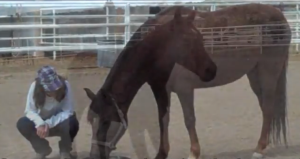
This horse isn’t thinking. He isn’t engaged. We want that horse to start thinking – now. A horse without a brain is not fully functioning and enjoying life, even if he or she seems quiet and good for the most part. When I say this I don’t mean he is not intelligent, just that his intelligence may be occupied in something other than the current activity – flight or freeze mode. He could also just be “doing his job.” But he could also be shut down in some part of his being, perhaps frozen in a psychological sense, such as Peter A. Levine, author of Waking the Tiger: Healing Trauma, talks about in people who have post-traumatic stress syndrome (PTSD).
This can often happen from past abuse or neglect. As a matter of fact, I see it often in abused or rescue horses. This is not normal horse behavior. A horse generally gets tense, excited, frightened and dispels trauma very quickly, through shaking, bucking or somehow exploding it out. Then they are quiet.
Levine asks the question: “Why is it that non-domesticated prey animals are rarely traumatized? …Their lives are threatened routinely – yet, they are rarely traumatized when in the wild. Observations of wild animals in their natural environments led to the premise that animals have a built-in ability to rebound from a steady diet of danger. They literally “shake off” the residual energy through trembling, rapid eye movement, shaking, panting and completing motor movements.”
It is a human tendency to hold onto trauma in freezing, outbursts, violence or other non-productive behaviors. Horses revert to that dysfunction when they have been mishandled by humans.
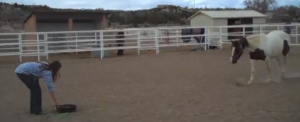 On the outside, the horse can seem very easy to deal with, unless he is asked to approach something he can’t do. Sometimes the horse will do everything he is asked, but with urgency and without eye contact, just wanting to get it over with. With a horse like this I will usually begin by doing Equine Ortho-Bionomy or Equine Positional Release (EPR) to address the trauma. The horse will need to dispel a lot that is trapped in the body. This allows the animal to move more freely and begin to engage in life. Unwanted behaviors can also begin to fall away.
On the outside, the horse can seem very easy to deal with, unless he is asked to approach something he can’t do. Sometimes the horse will do everything he is asked, but with urgency and without eye contact, just wanting to get it over with. With a horse like this I will usually begin by doing Equine Ortho-Bionomy or Equine Positional Release (EPR) to address the trauma. The horse will need to dispel a lot that is trapped in the body. This allows the animal to move more freely and begin to engage in life. Unwanted behaviors can also begin to fall away.
Ortho-Bionomy is used very successfully in the treatment of PTSD for veterans and abuse victims, as well as for learning differences such as Attentive Deficit Disorder (ADHD), Autism and Aspergers, among other conditions. For two years, I worked in the Ortho-Bionomy in Schools program held here in Santa Fe to introduce this work to children. I have adapted many of the Ortho-Bionomy techniques used there to working with horses.
![Neck release [Catherine Sobredo Photography]](https://horsesatliberty.files.wordpress.com/2012/08/imgp2369-edit.jpg?w=198)
[Catherine Sobredo Photography]
I also train in small increments with horses like these, so they can think about what we were doing before going on to the next exercise. What we notice in clinics is that a horse will come in in the morning, do a foundation or two and have some time to think before doing another one in the afternoon. In the afternoon, they will almost invariably offer a lot more because of that space they had to think about it and let it integrate. This is true for most horses.
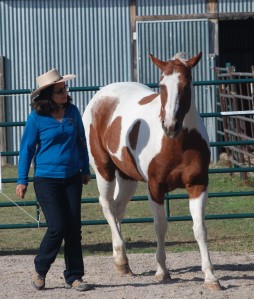 Getting a horse to think and engage is an exciting path that can be full of surprises as their true self emerges. This is the avenue by which I can ultimately ask that horse to do other things, always in the same spirit of fun and curiosity!
Getting a horse to think and engage is an exciting path that can be full of surprises as their true self emerges. This is the avenue by which I can ultimately ask that horse to do other things, always in the same spirit of fun and curiosity!
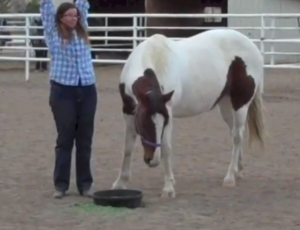
Bodywork: private sessions, tutorials, phone consultations, distance healing and gift certificates
Liberty Training: clinics, private sessions, tutorials, consultations: by appointment: 505.501.2478 or emailing susansmith@orthohorse.info
My upcoming Horses at Liberty Foundation Clinic will be held May 25-26 in Santa Fe. If you’re thinking of visiting Santa Fe, this might be the time! Contact me if interested!



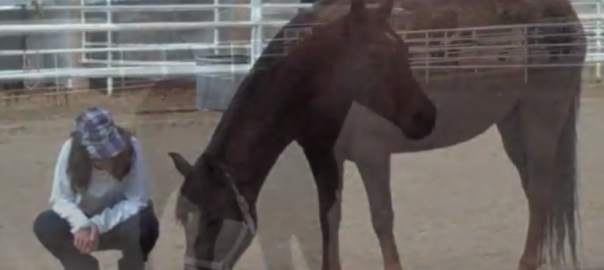
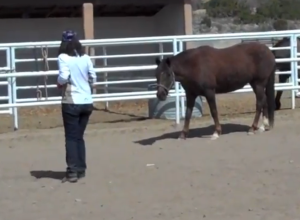
Outstanding explanation of how to deal with a shut-down horse, whatever the reason Thank you, Susan!
Ruella Yates
Liberty Foundations @ Spirit Horse Ranch